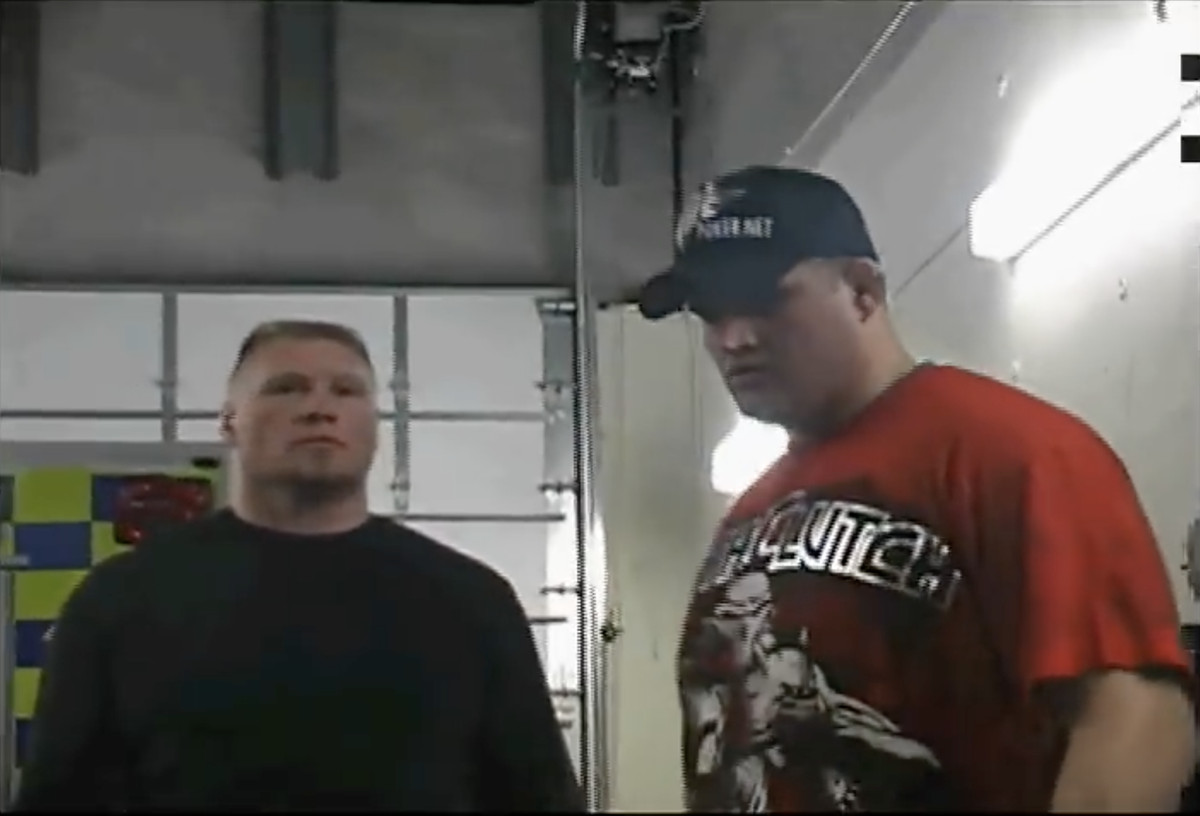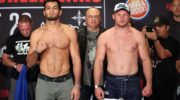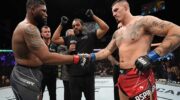The saga of Cole Konrad has long be an obsession of mine. Or rather, how it ended and what happened afterward. The mystery and absurdity beneath it all.
I may be the only person under age 35 to feel that way, but I can’t help it. Because 10 years later, Konrad is still the unicorn. The undefeated champion who pulled off one of the sport’s great escapes. The 300-pound goliath who woke up one morning, tiptoed out the back door and vanished into thin air, never to be heard from again. Why? It’s a page of MMA lore that will forever read like a Mad Libs on meth: One of the most decorated American heavyweight wrestlers of his era, famously hailed by Brock Lesnar as “the strongest son of a b**** I’ve ever met,” yet he throws it all away overnight without even a look back?
Just to work in dairy??
“Cole Konrad was the toughest guy in the room. In Brock Lesnar’s room, with all the Minnesota wrestlers, he was the guy,” remembers longtime coach Erik Paulson.
“When you look at what was out there, nobody at the elite level had his credentials,” says ex-MMA commentator Jimmy Smith. “Meaning, Cain [Velasquez] was an All-American, Brock had one national title. This guy had two — and he was a big-ass heavyweight. If you look at the stretch of heavyweights from his era to now, as far as what he was picking up and how good he was in nine fights, he might have been on an island of his own if he kept going.”
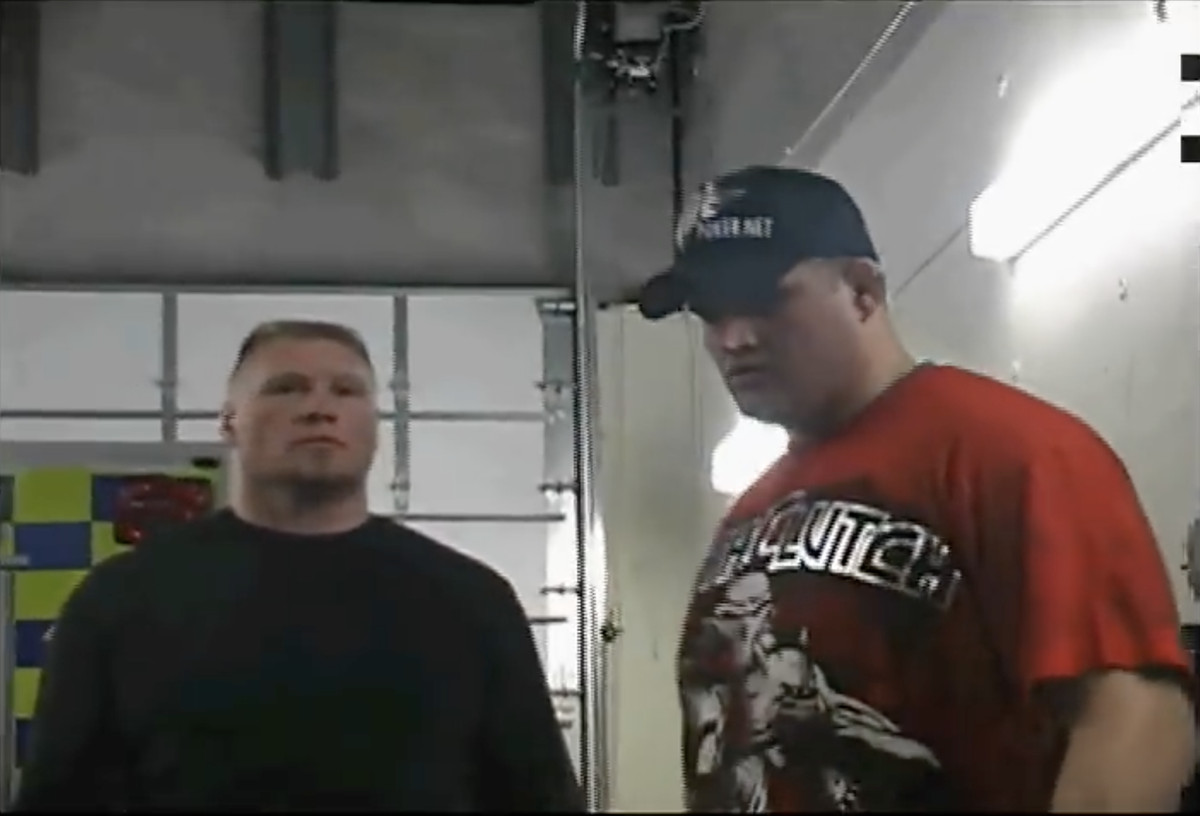
At the time, no one saw it coming. How could we? He hadn’t even gotten started. Konrad was only 28 years old and dripping with potential. Hell, he beat Velasquez seven times out of eight in college. Massive and mean, deceptively athletic for his size, a specimen in every sense of the word, he accomplished more in less than three years of MMA than most big men do in a career. Heavyweight is one of the few lanes to earn real money in fight sports, and he was the right-hand man to a superstar. Lesnar’s protege: “The Polar Bear.”
He had it all set up. And now? The fleeting nature of MMA retirements has long been a running joke, yet his is the one that actually stuck. No flickers of a comeback. No slow drip of training photos on social media. No wistful trips down memory lane. Nothing. From the moment he left in September 2012, it’s as if he never existed. A ghost.
Maybe that’s what he wanted? The forgotten champ. The knee-jerk answer whenever the question turns to MMA’s biggest what-ifs.
Because even now, after all these years, Konrad is the one who got away.
The ghost still looks like he can go.
Cole Konrad is 38 years old and sitting inside an empty office at Viking Dairy Company on a Tuesday afternoon in Eden Prairie, Minn., his blue and white striped polo hanging loosely off a broad, 6-foot-5 frame. It’s an old shirt — and big on him. Konrad says he’s dropped more than 100 pounds over the past few years, mostly due to an embrace of the masochistic world of running. It’s miserable, he says, but a little self-punishment every day does the mind and body good. Sheepishly, he tells me he’s down to around 240 pounds and moving around better than he has in long time. The lack of scarring on his brow and straightness of his nose paints the picture of an office worker, but closer inspection of the gnarled chunks of old cauliflower clinging to his ears tells the truth of a past life.
This past May marked the 10-year anniversary since Konrad’s final cagefight. It came and went without him realizing. He doesn’t follow the sport anymore. The former Next Big Thing suspects he’s seen maybe three events since 2012. Most of his updates nowadays come from his neighbors down the road who follow MMA religiously. Like clockwork, they’ll ask if he caught the fights over the weekend, and he’ll give his usual reply: You know the answer. Just tell me what happened. They’re always bursting to oblige.
Even now, Konrad can’t seem to escape it. The game chases him. It’s been a decade since his retirement, yet rarely does a stretch go by without a new colleague or acquaintance haranguing him with the same game of 20 Questions. Some remain easier to answer than others. His old heavyweight championship belt, for example — where is it? Konrad gets that question a lot. It’s an easy one, because your guess is as good as his. Ditto for his two NCAA Division I wresting national titles, or his four NCAA All-American honors. He suspects they’re all collecting dust somewhere in storage. Decades of blood and sacrifice, forgotten under a pile of musty clothes, perhaps at the bottom of some shoebox. Konrad just shrugs. He’s not particularly concerned. He isn’t keen on looking back.
“Just never really been my thing,” he says.
What about his proudest MMA moment? That’s another question. Also recurring, also easy, because there really aren’t any. In 2010, his first year of active competition, Konrad rattled off a 7-0 record, won a $100,000 eight-man tournament, seized the Bellator inaugural heavyweight strap, and captured Rookie of the Year honors from a smattering of media outlets. He was widely considered one of the top heavyweight prospects in combat sports, a big man with stupefying natural gifts who’d already taken top honors as the Big Ten Conference Male Athlete of the Year and departed the University of Minnesota as the school’s all-time leader for consecutive wrestling wins (76). His talent was prodigious enough to draw the eyes of Lesnar, and he quickly became Lesnar’s main training partner. Together, the two formed the core of the infamous Team DeathClutch. For a brief moment in time, they reigned as concurrent champions of their respective promotions.
Ask him what sticks out though, and Konrad just lowers his eyes and deflects. “I never really think about being proud about winning, to be honest,” he says.
Then he gives that same aloof shrug.
“What’s funny,” he continues, “is my kids have no idea. At all. Not a clue.” Not about the cage-fighting. Not about dad’s war stories with a WWE legend. And especially not about everything he chose to leave behind. The only clue left in the Konrad household pops up whenever the little ones are bickering and he resorts to his favorite line: No fighting in the house … unless you’re getting paid for it.
The pause before the punchline always gets him. “I say that every time,” Konrad chuckles. “And my wife’s like, ‘You’ve got to stop saying that, they’re going to figure it out someday.’”
She’s probably right.
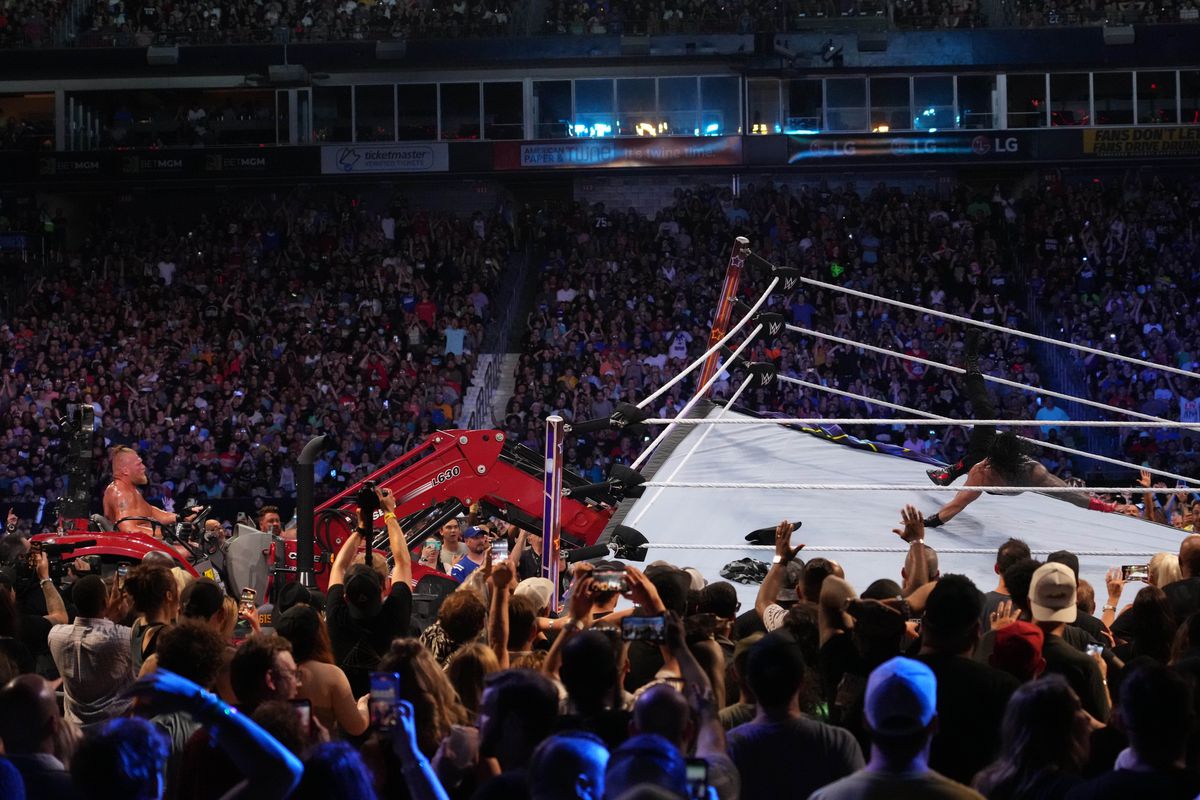
It may as well be a lifetime ago. Today, Lesnar is still one of the biggest star athletes on the planet. This past July, he headlined WWE’s monstrous pay-per-view, SummerSlam, where he drove a tractor straight through the wrestling ring in an effort to take down rival Roman Reigns, setting the internet ablaze. Konrad, by contrast, lives in a wholly separate universe. He’s exactly where he set out to be when he shocked his teammates, his promoters, and the whole damn sport with his sudden retirement: A commodities trader for the dairy industry.
His days start at 5:30 a.m. He runs a division of around a dozen people. Much of the work deals with importing and exporting. Sweeteners, stabilizers, and emulsifiers. Sodium citrates, lecithins, and amino acids. Pantoic acids, whey protein isolates, and hydrolysates. “All sorts of boring s***,” he says. If it deals with dairy or goes into a nutritional shake, Konrad has a hand in peddling it. He’s not picky. “I sling dairy all day and I drink almond milk,” he says, laughing at the rise of pseudo-milks. “So it all has its place in the market.”
How did he end up here?
An MMA champion leaving the cage behind to sell milk futures felt like the most appropriately farcical turn for the sport in 2012, but Konrad’s grandfather worked in the industry for decades, hence why it was on his radar. A pipeline to the business also emerged within Minnesota wrestling, which helped recruit Konrad and convince him to make the leap. The current president of his company is a former college roommate. Athletes somehow swarmed the trade — and for good reason. It’s a lucrative gig.
“Some of the different things that we get asked for are pretty off the wall,” Konrad says. “Cricket proteins and s*** — and it’s actually trying to gain some market share. I mean, good luck to them. That’s just, at the end of the day you’re still eating a cricket, so it’s a tough one. If you can sell that, Christ, you can sell anything.”
It’s all very low-key. Phone calls and emails. Entire afternoons swallowed up in front of a computer screen. When Konrad describes it, he may as well be the most ordinary man in the room, which only makes it all the more jarring every time his old life starts seeping in. That part still baffles him. How do people even remember? Or better, why do they remember? “It’s unbelievable how many times I talk to someone relatively new and they start off by calling me ‘Polar Bear,’” he says, “I’m like, ‘Oh, goddammit. This f****** nickname.’” It’s always the people who can’t understand how he could’ve done what he did, or why he quit despite being so successful at a job title that literally translates out to “professional athlete.” That’s when another round of interrogations start.
The easy questions first, of belts and favorite moments.
Then the harder questions later, of whys and regrets and what-could’ve-beens.
Bellator MMA
Marty Morgan still remembers when he first knew.
The old mat coach is a legend around the University of Minnesota, a no-nonsense wrestling lifer who’s been on more recruiting trips across the upper Midwest than anyone could ever count. But the first time he met the game’s forgotten champion? He’ll never forget that one. Konrad was just a big kid in those days, awkward and raw and underdeveloped. The Gophers already had a high-level heavyweight on the team at the time, so Morgan and his staff figured, hey, we’ll give the boy a shot, maybe he could grow into a decent backup one day. “Then he was all of a sudden the starter. And just like that, he took over his freshman year and took fourth in the country,” Morgan says.
“After that, I don’t know if he only lost maybe two more times in college, I think, his last three years.”
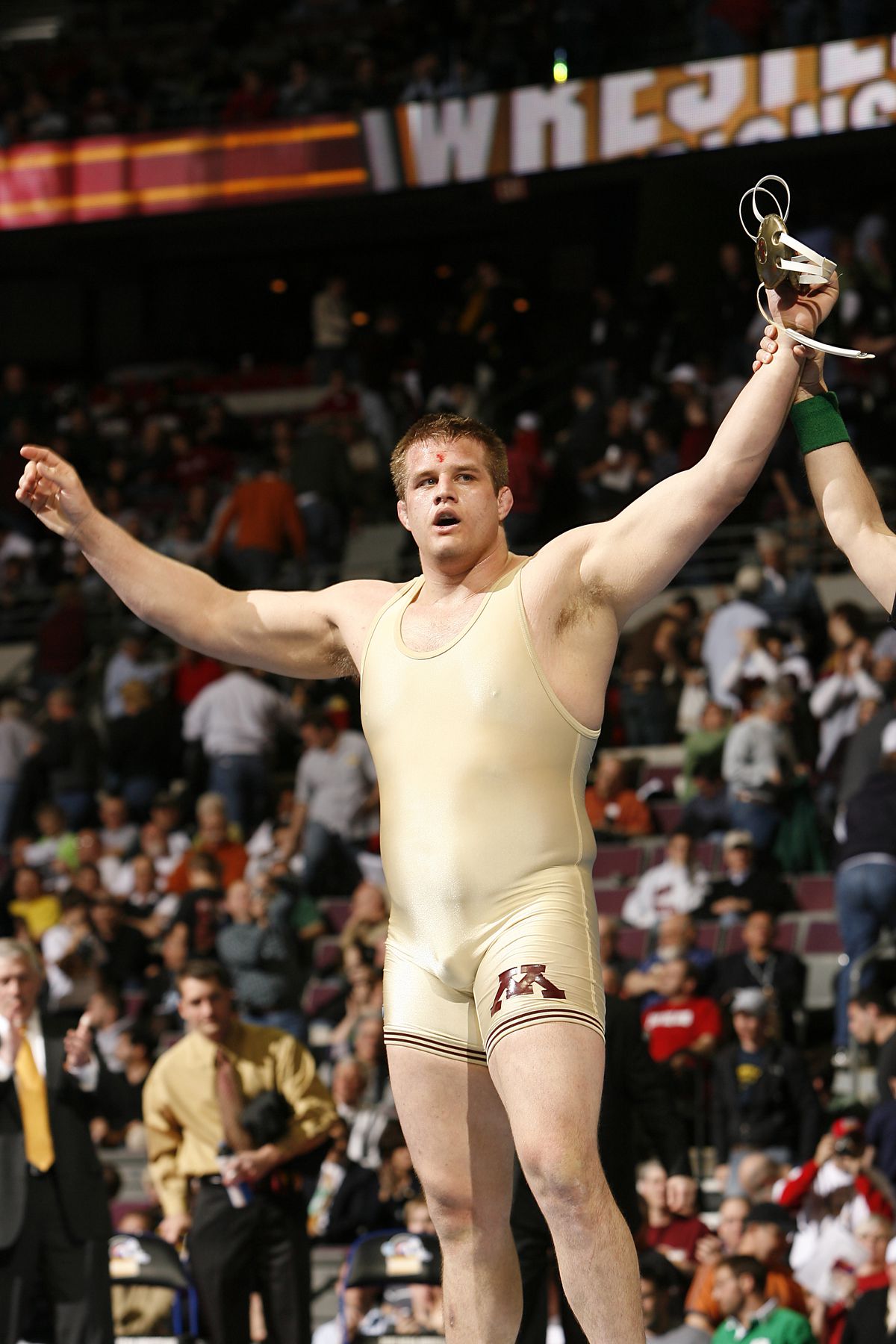
Konrad became notorious. “The Iceman,” Morgan calls him. Heavyweights close the show in amateur wrestling, and 18 times, the university’s fate “came down to Cole winning or not — and Cole was 18-0 in those matches,” he says. “So when the pressure was on, he always handled business. And I’m talking about national dual finals, NCAA finals, Big Ten finals. He was 18-0 in all those situations. It was a big deal. You needed to get something done, this was the guy.”
It was an inevitability then, that in the summer of 2007, when Lesnar recruited Morgan to help guide a transition from souped-up professional wrestler to an eventual UFC heavyweight champion, Konrad was one of his first calls. The WWE star’s near-superhuman size presented a unique challenge — who could really push such a physical freak? But Konrad was more than 300 pounds of deceptive fast-twitch of his own, a grizzly bear buried beneath a layer of baby fat.
The DeathClutch room soon became a rollicking sight.
“Those guys would just be flying in there,” marvels coach Greg Nelson. “I remember we had this big dividing wall in our gym, and those two guys would hit that wall and I literally thought it was going to fall over. It would just shake, and the mirrors would be shaking, and I’m going, ‘Man, that’s like 600-plus pounds bashing into that wall.’ It was amazing. Huge, giant human beings, yet they’re moving so fast and quickly, like lightweights.
“Cole having the body that he did, it was totally as if you’re looking at this like, ‘This shouldn’t be. He shouldn’t be moving like this.’”
Similar to Lesnar, who rose to become UFC champion with less than two years of MMA training, Konrad proved to be a fast learner. “I guarantee it: That’s Cain Velasquez at 300 pounds. I know it,” a UFC teammate proclaimed at the time. “Just because the way he was built, people didn’t think that he was going to be the fighter he was going to be,” says Morgan. “The thing is though, he had all the skills. He had very long reach, a very loose, long jab, and it was very difficult to hit him. But you couldn’t get close because he was such a good wrestler. So it was almost like, how are you going to beat this guy?
“Right when we started sparring, I just thought, ‘He could be so good at this.’ And sure enough, he was.”
By 2010, the team had seen enough.
Konrad never intended to turn MMA into a career, but the old mat coach was convinced. Morgan gave him an ultimatum: Either we’re going to find you a fight, or you can’t come back. Konrad was having such a good time in the practice room, he opted for the former. By his fifth month as a professional fighter, he’d already been snapped up by Bellator officials convinced they had found a dominant new face of their heavyweight division.
The whispers around the signing were electric. “’Brock can’t push him around like he does to everybody else’ — that was the major thing I heard [around the organization] back then,” remembers Smith, who juggled commentary and analyst roles within Bellator at the time. “It was, ‘Brock kind of beasts everybody. He can’t beast Cole Konrad. Can’t do it. Can’t do it. Dude’s too strong. Dude’s too big.’ And then also another thing was that he never [stopped]. Just a crazy good athlete, you could push him as hard as you wanted.
“Brock’s [physique] was more impressive looking, but when Cole got in the room with guys, then that’s when people started going, ‘Oh s***. This guy is really f****** good.’”
Konrad learned on the job. He fought five times in his first six months in Bellator and won them all, culminating in an October 2010 first-round stoppage that crowned him as the promotion’s first undisputed heavyweight king. Each time out, the leaps in his game were apparent. “He was beasting guys,” says Smith. “Just beasting them.” Paulson remembers one afternoon where he showed Konrad a single pass of a favorite catch wrestling trick; the next thing he knew, Konrad flawlessly pulled off the same double wristlock to finish his next fight, as if he’d practiced the move his whole life. “It was so easy for him,” Paulson says.
Smith’s favorite story came from the lead-up to Bellator 48, when the man tabbed to be the toughest test of Konrad’s run — one-time UFC title challenger Paul Buentello — repeatedly laid out his terms for every microphone in sight. “When we interviewed him, Paul Buentello said the whole time, ‘He’s never going to stand up with me,’” Smith remembers. “‘If he takes me down, he’s a p****.’ Like trying to almost shame him into standing up with him.”
The wrestler called his bluff and refused to shoot a single takedown, “and Paul Buentello didn’t do anything,” Smith says. “Paul Buentello went, ‘S***, this guy can box.’ Like, oh [Paul], who’s bad now? He stood with you the whole time and you couldn’t do anything.”
Konrad was far from a finished product, but his ceiling was tantalizing. He just needed time. And DeathClutch’s flag was planted atop the MMA world. Morgan remembers immortalizing the moment with a Polaroid in 2010 of his two titans standing side-by-side, Lesnar and Konrad, two kings with belts draped over their shoulders. Together, overnight, they’d built something from nothing, a powerhouse room known the world over. It was a proud time. “Our own small little gym,” Morgan says, “and we had both of the heavyweight champions.”
That photo is lost now. Morgan dug and dug and dug, checked phones and old Google drives and anything to scrounge up a copy, but it vanished years ago. He’d like to find it one day.
In some ways, it’s all that’s left.
The ghost has places to be.
It’s late afternoon in Eden Prairie, and with the gloom of the evening creeping in, soccer practice is up next for Konrad’s two little girls, 8-year-old Kensington and 7-year-old Remington. The two take after their mother, Konrad’s wife Carlie, who in her past life was a collegiate soccer player at the University of Minnesota. It’s where she and Konrad first met. Nowadays, Carlie coaches the girls’ team. Kensington and Remington are obsessed with the game, just like their mom. The family schedule is busy. Soccer practice with the girls on Tuesdays and Thursdays, then baseball practice on Mondays and Wednesdays with 5-year-old son Judge. Konrad heads to both straight from work. He’s rarely afforded a moment to catch his breath.
The end came suddenly for everyone in DeathClutch. By the start of Konrad’s third year in 2012, Lesnar had stepped away from MMA entirely. The UFC heavyweight title that’d been a source of such acclaim for the team was gone, lost at UFC 121 when Konrad’s old college foil Velasquez dispatched Lesnar with violent and abrupt ease. The WWE and UFC superstar’s well-documented struggles with diverticulitis had taken their toll, and Lesnar simply wasn’t the same overwhelming force of the past, so he slid back into his role as a premier name in professional wrestling.
With Lesnar gone, the writing was on the wall for a group who’d been designed from the ground up around his needs. Weeks after Lesnar’s exit, Morgan sowed the seeds for his own backup plan by opening a realty company. He had a family to feed, and coaching full-time without the superstar couldn’t pay the bills.
The room had changed in an irreparable way. It was hard to avoid the sense that an era had slipped through their fingers.
In retrospect, it was the final push Konrad needed. He liked MMA, he says, “but I didn’t love it.” An important distinction. The difference between a youth fulfilled or a decade of gradual slog. “I never set out to fight. At all,” he says. “I set out to train with Brock, because he needed training partners. It’s just, one thing led to another. But I guess in my mind, it was always somewhat going to be a short-lived career. I didn’t want to be a guy who was in the arena fighting in my mid 40s. That wasn’t going to be me.”
That’s how it goes sometimes when you’re young. One thing leads to another, then suddenly you’re being handed an oversized six-figure check for beating another man into a bloody pulp, told you’re going to be the next heavyweight star, caught in the thrall of a calling that was never truly your own. But Konrad says that he knew. Maybe it took him a while to admit it, but in the back of his mind, he always knew. He didn’t have the same aura of his world-renowned pal, or the same superhuman physique that leapt straight off the poster and into one’s bank account. He wasn’t loud and boisterous like some of his other teammates. He was soft-spoken, overly humble, someone who didn’t crave the planet’s attention. Once Lesnar left, that became clear. It was anathema to him. All of it.
“I never wanted the spotlight,” Konrad says. “I just wanted the competition.”
But reality didn’t fully smack him in the face until May 2012. If Konrad has any misgivings about how things ended, it’s this one. Because when he stepped into his first title defense against a flawed but dangerous heavyweight named Eric Prindle at Bellator 70, Konrad committed his cardinal athletic sin: He disrespected the game. It was a culmination of everything he’d been feeling. He spent the lead-up to the fight vacationing in Ireland with Carlie to celebrate their one-year anniversary. He didn’t train. He wasn’t in shape. His afternoons were flush with golf and site-seeing, his nights awash in good times at the local pubs. By the time he landed back stateside, it was three days before the event and he’d barely worked a single second. It wasn’t who he was. Konrad was ashamed.
“Regardless of how the fight turned out,” he says, “I deserved to lose for that reason.”
Bellator MMA
He didn’t lose, of course. Ironically, in perhaps the biggest testament to his potential, Konrad fought solely off instinct and natural ability and smashed through Prindle in 60 seconds, nearly tearing the former U.S. Special Force’s sniper’s arm off with a first-round stoppage. For some, the experience would’ve been emboldening. After all, Konrad still left with a belt around his waist and his unblemished record intact, despite lifting nary a finger to prepare. He was built for the game, clearly. But it didn’t matter. All he could feel was disgust. And that was enough.
His mind wasn’t going to change.
“That was the first time I cut corners for a competition before, and it’s just not the right way to do it,” Konrad says. “That’s just not how you approach things if you’re going to be good at them. So that was the biggest eye-opener for me. And I just wanted to disassociate with it. My identity was surrounded by athletic accomplishments. I was just like, ‘You know what? I’m done with athletics. Let’s make a name doing something else.’ So I had to focus on that. Very one track, this is direction I’m going, I don’t care what I did yesterday, that’s done now. Here I am. I have to go.”
Konrad quietly informed Bellator officials. He was resolute and refused to reconsider. He needed a clean break. He didn’t speak publicly again until six months later, when he agreed to do one lone interview to explain why he’d thrown it all away. In it, he called MMA “a pretty dead-end job.”
And then he disappeared into the ether, seemingly never to be heard from again.
Konrad is back on familiar ground, back in one of the last places he ever expected to be.
Fifteen years after his final wrestling match, the game’s forgotten champion is home again on the mats near Eden Prairie, coaching for all-boys school Saint Thomas Academy. It’s a new addition to his Monday and Wednesday routine, a trek he makes after Judge’s baseball practices. The busy schedule gets even busier. This one wasn’t planned; rather, it just kind of happened. A year ago, a friend phoned Konrad after taking over a high-school program just up the road. He asked Konrad to stop by the room every now and then to help the kids. With enough pestering, the champ relented. What could it hurt? By then, he’d created a wholly new life for himself. Enough time had passed to let that old part of his self start to seep back in. A year later, when that same friend transferred to a job down in Texas, Konrad agreed to stay on in a broader role. He’s the co-head coach now.
Coach Cole Konrad.
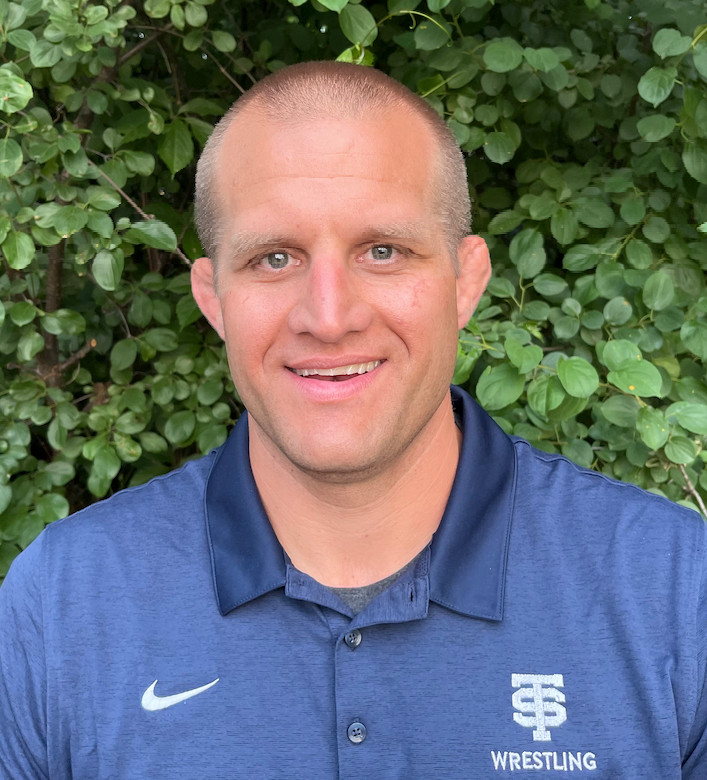
It has a nice ring to it.
His old DeathClutch teammates were delighted. Both Morgan and Nelson coach part-time in the same region. They knew Konrad at his heaviest, and both were shocked the first time they saw the slimmer, more trimmed-down ghost from their pasts getting after it once again on the mats. “It’s crazy,” jokes Morgan. “He looks totally different. I always tell him, I like the old Cole. I don’t know what happened to him. But if he were to fight now, he’d be even better, because he’s a lot leaner.”
It’s a heartening sight. Konrad has so much skill and so much to offer, says the old mat coach, it’s wonderful to have him back at the forefront and be able to pass all that knowledge on to the next generation. “It’s a great thing for wrestling,” Morgan says, “and a great thing for Cole.” Even Konrad didn’t expect to enjoy it as much as he has. “To be honest, you kind of forgot everything that you did enjoy about it,” Konrad says. “Because towards the end, I wasn’t really enjoying wrestling. So when you go back out there and you’re helping high-school kids who aren’t at that higher level yet, and you’re breaking some stuff down for them and you’re seeing the gains on them, it’s just very rewarding to watch them start to flourish. Just seeing kids turn the corner.”
Judge is nearing the age where he’s starting to take an interest as well. Konrad says he wants the program to be good just in case little man decides to wrestle. The game runs in their blood, after all.
It’s all still complicated, but Konrad promises his past was never something he purposefully hid from his children. The cage-fighting. Their dad’s war stories with a WWE legend. And especially not everything he let go. He says he’d tell his children about his old life now if they asked. It was just that, at least back then, once he’d moved on, he’d moved on. A clean break, remember? What’s really the point of looking back?
Konrad points out his munchkins do have some vague sense, at least, about his wrestling accomplishments. His return to coaching started that ball rolling, then just recently Konrad was inducted into the University of Minnesota’s Athletic Hall of Fame. That was the kids’ first real glimpse into the ferocious champion their dad used to be. It’s funny. An honor that’d be a highlight of most people’s lives, but Konrad can’t help but turn his eyes downward and deflect, embarrassed, when congratulated. He insists it wasn’t much of a big deal.
Of course.
He swears he doesn’t have any regrets though. Actually, he corrects himself, there are at least two: One with the way things ended with Prindle, the other that he didn’t get back involved in wrestling sooner, whether through coaching, mentoring, or other avenues. After that? None. Nada. He’s perfectly content. Or at least that’s the company line any time people ask. It’s very possible he’s telling the truth. Or at least, some version of it. But he’s only human, forever a stubborn wrestler at heart. Even if he tried to quiet it for a decade, that competitive flame is hard to snuff out for good.
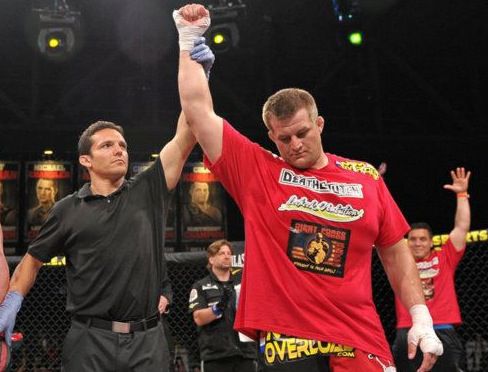
Bellator MMA
Because Cole Konrad might’ve been a UFC champion. Eventually, if he’d continued on. They all have no doubt. “He was such a bear, I personally think he would’ve beaten everybody,” says Paulson. “Bellator was just getting started,” says Smith. “They weren’t paying UFC money yet, and it didn’t make financial sense for some people to do it. And I just wonder if maybe he had been around during the Scott Coker years and if Scott would have gotten behind him, if things would have been different. And it sucks. It’s disappointing.” Even Konrad. He just needed more fights, he says, more experience, more mornings, afternoons, and nights getting bruised up in the DeathClutch room, but “I could have gotten there,” he swears. “I’m humble, but I don’t lack confidence.” Going live rounds as a rookie every week with the baddest man on the planet tends to give you get a sense of where you stand.
He’s still the prime age for a heavyweight, though. Konrad chuckles when I point that out. It’s true, and he’s in his best shape in years.
So it’s fair to wonder: Given six months to prepare, could he come back and contend?
“Yeah.”
The answer is automatic. No hesitation. No frills. No bulls***.
And just like that, I can’t help myself — another round of the same tired questions kick off, the same haranguing interrogations. Poor Konrad. It never ends.
There’s a long pause after the next one though, the same question I’ve been holding off asking, but also one Konrad hears often.
For the right opportunity…would you ever fight again?
Maybe it’s all the forced trips down memory lane, but often it’s an immediate no; today, though, the words hang in the air for what feels like hours.
“Yeah,” Konrad finally says. “Yeah. One go-round of a hard competition and something to train for? Yeah. That’s a big hypothetical, because, I mean, I highly doubt it would ever come together, just given all my other obligations these days. But from the competitive standpoint, yeah.”
Konrad pauses again, then jokes that Carlie better not see this interview. Then there would really be hell to pay. It doesn’t matter anyway, because no one’s reached out since he went dark — no promoter, no manager, no nothing. Considering how hard he is to track down, and the lengths he went to divorce himself from the game, that feels more purposeful than not. Besides, he circles back, it’s not as if he would’ve ever gone back on his word.
Still, it’s hard not to consider the possibilities. How long could King Cole have reigned? Bellator broke through with its Spike TV deal almost as soon as he left; if he had stayed, how would he have fared against the cadre of heavyweight champions who followed? Is there a timeline out there where Konrad crossed over to the UFC and tested himself against the Hall of Famers of the era, legends like Velasquez, Cormier, and Miocic?
Who knows?
In the end, it’s all flights of fancy and silly hypotheticals. Because the truth is, he’s right: It doesn’t matter. Konrad won. He’s healthy and successful. His career has been more bankable than that of most UFC heavyweights and he hasn’t gotten bashed in the brains to make his money. He and his family travel on the weekends. They visit national parks, get the three little ones out in nature. “He went in there, whooped up, got out, lived life,” says Nelson. And he did it all on his terms.
Forever the unbeaten champ. Forever the one who got away.
What more could a guy ask for?
Yes, Konrad was always destined to be the rare MMA retirement to hold. He will never understand the rest; how he’s forever going to be “The Polar Bear” to some, and why there’s eternally going to be another round of 20 Questions lying in wait whenever a new acquaintance does a double take and realizes, ‘Wait, you’re that Cole Konrad?’ If it used to bother him before, back when he was still trying to make a clean break, it doesn’t anymore. It’s a part of his story, and will be forever.
Ten years later, that’s OK.
